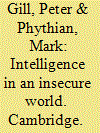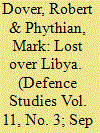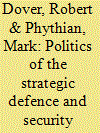|
|
|
Sort Order |
|
|
|
Items / Page
|
|
|
|
|
|
|
| Srl | Item |
| 1 |
ID:
079214


|
|
|
|
|
| Publication |
2007.
|
| Summary/Abstract |
This article assesses the British experience with intelligence accountability through an analysis of the principal mechanism that exists to provide for it - the parliamentary Intelligence and Security Committee. It discusses the context within which oversight proposals emerged, the debate surrounding the nature of the new oversight body, and assesses the performance of the Committee over the first decade of its existence. It concludes that while the Committee has secured some important advances with regard to the accountability of the intelligence and security services, there are nevertheless significant limitations and weaknesses, many of which were evident in the Committee's 2003 investigation and report into pre-war intelligence on Iraqi WMD. In this context, the debate as to whether the oversight body should have select committee status, discussed at length in the article, remains highly relevant
|
|
|
|
|
|
|
|
|
|
|
|
|
|
|
|
| 2 |
ID:
119419


|
|
|
|
|
| Publication |
2013.
|
| Summary/Abstract |
A decade ago, the literature on the relationship between ethics and intelligence was very limited. However, the post-9/11 (11 September 2011) intelligence and security environment, in which national intelligence agencies have been required to play front line "war on terror" roles, has heightened the importance of debate about, and an informed understanding of, the ethics-intelligence relationship. But any such debate requires a framework. Consequently, over recent years, a literature on ethics and intelligence has begun to develop. Our aim is to contribute to this movement, add further flesh to the framework, and encourage others to participate in the debate.
|
|
|
|
|
|
|
|
|
|
|
|
|
|
|
|
| 3 |
ID:
143746


|
|
|
|
|
| Summary/Abstract |
n December 2014, the US Senate Select Committee on Intelligence (SSCI) released a summary report of its investigation into the Central Intelligence Agency’s (CIA) Detention and Interrogation Program during the ‘war on terror’.1 This amounted to less than a tenth of the full report2 – which remains classified – yet represented the culmination of one of the most contentious investigations in the history of the SSCI, into one of the controversial episodes in the history of the CIA.
|
|
|
|
|
|
|
|
|
|
|
|
|
|
|
|
| 4 |
ID:
153078


|
|
|
|
|
| Summary/Abstract |
This article considers the parallels between social science approaches to research and the practice of national security intelligence analysis. Just as it is important for policymakers and citizens to understand the limits to what intelligence can deliver, so it is important to recognize the limits to what social science methods can offer intelligence analysis. Moreover, it is at least equally important to recognise crucial differences in the environments in which mainstream social science research and national security intelligence analysis are conducted. A clear understanding of these is essential to thinking about the utility of social science approaches to intelligence analysis. Hence, the chapter begins by setting out what qualitative social science can offer and then goes on to explain why the straightforward application of social science techniques cannot of itself be regarded as a ‘silver bullet’ for the challenges confronting intelligence analysis.
|
|
|
|
|
|
|
|
|
|
|
|
|
|
|
|
| 5 |
ID:
143745


|
|
|
|
|
| Summary/Abstract |
The journal of Intelligence and National Security (INS) is now 30 years old. The first issue was published in 1986 under the leadership of the founding editors, historian Christopher Andrew of Cambridge University and military analyst Michael Handel of the US Naval War College. Two more issues would soon follow, making up the first volume of INS. An editorial in the inaugural issue pointed out that this was: ‘the first scholarly, interdisciplinary journal devoted to the past history of intelligence work, to the analysis of its contemporary functions and problems, and to the assessment of its influence on foreign policy and national security’.
|
|
|
|
|
|
|
|
|
|
|
|
|
|
|
|
| 6 |
ID:
159924


|
|
|
|
|
| Summary/Abstract |
The question of how to reconcile the practice of national security intelligence with the values on which liberal democracies are understood to be based was very much present at the creation of Intelligence Studies. At a time when the conceptual landscape of Intelligence Studies has broadened, this article represents a revisiting of these first principles. In it, I explain the normative tension between the requirements of liberal democratic orders and the practice of national security intelligence as arising from three sources. First, the confusions that arise from liberalism itself as an ideology. Second, the constraining effect of the international. Third, the constraining ‘problem’ of the nature of the liberal democratic state. In light of these and contemporary anxieties about the implications of intelligence practice for liberal values, I discuss how far it is possible or useful to think in terms of ‘liberal intelligence’ and what its core characteristics might be held to be.
|
|
|
|
|
|
|
|
|
|
|
|
|
|
|
|
| 7 |
ID:
072401


|
|
|
|
|
| Publication |
Cambridge, Polity Press, 2006.
|
| Description |
xvi, 228p.
|
| Standard Number |
0745632459
|
|
|
|
|
|
|
|
|
|
|
|
Copies: C:1/I:0,R:0,Q:0
Circulation
| Accession# | Call# | Current Location | Status | Policy | Location |
| 051358 | 327.12/GIL 051358 | Main | On Shelf | General | |
|
|
|
|
| 8 |
ID:
108603


|
|
|
| 9 |
ID:
076913


|
|
|
|
|
| Publication |
2007.
|
| Summary/Abstract |
This article considers how three countries - the United States, the United Kingdom and Australia - approached the lead-up to the invasion of Iraq in 2003 by examining how the leaders' decision-making interacted, the commonalities of their policy-making processes, and the approach to policy justification taken in terms of their domestic political environments. In particular, it examines the extent to which their claims as to why invasion was necessary went in synchrony. Having decided on war, all three national leaders sought to persuade their publics of the moral imperative for invasion and the immediacy of the threat that needed to be eradicated, and each made secret intelligence public in so doing. The selective use of intelligence allowed the politial leaders to shift the focus of the blame from policy-makers to intelligence accuracy when the immediate threat from weapons of mass destruction turned out to be illusory
|
|
|
|
|
|
|
|
|
|
|
|
|
|
|
|
| 10 |
ID:
113403


|
|
|
|
|
| Publication |
2012.
|
| Summary/Abstract |
Today, the idea of risk is ubiquitous, a presence in debates across a range of fields, from investment banking to politics, from anthropology and sociology to health, environmental and cultural studies. While this ubiquity attests to the importance of the concept it is at the same time a potential weakness in that it injects the term into a wide range of debates in each of which its meaning can be subject to different emphases and meanings. The notion of risk is of obvious importance to security intelligence, but here too its ubiquity has had an impact on specificity of meaning. While the term is widely used in both the profession and study of intelligence, its usage can carry different meanings and it can be used interchangeably with linked terms. Given the importance of the idea of risk to intelligence, clarity of meaning is essential. This article sets out to consider the meaning of, and relationship between, uncertainty and risk in a security intelligence context, propose a framework on which a common understanding can be built, and illustrate how this can help in thinking about the nature and role of security intelligence.
|
|
|
|
|
|
|
|
|
|
|
|
|
|
|
|
| 11 |
ID:
111667


|
|
|
|
|
| Publication |
2012.
|
| Summary/Abstract |
This article examines the politics of the October 2010 Strategic Defence and Security Review (SDSR), focussing on the points of difference between the main political parties (and within the Cameron coalition government) and the political dynamics of the review process. In examining how the government's core mission to reduce the country's 'historic deficit' impacted on the review process and outcomes, we are also able to highlight the practical results of a political philosophy that is currently being implemented across Whitehall. We argue that defence is a path-finding policy area for a new kind of post-industrial bureaucratic environment typified by a 'thin-client' and 'smart customer' function that interacts with industry.
|
|
|
|
|
|
|
|
|
|
|
|
|
|
|
|
| 12 |
ID:
149464


|
|
|
|
|
| Summary/Abstract |
Michael Herman is a pioneer of the academic study of intelligence. His career spans the worlds of intelligence and academia in the United Kingdom, and has done much to bring the two closer together. Born in 1929, Michael was educated at Scarborough High School before securing a scholarship to read Modern History at Queen’s College Oxford, in 1946. His studies there were interrupted by two years’ National Service between 1947 and 1949, when Michael served in the Intelligence Corps in Egypt. He then returned to Oxford to complete his studies and was awarded a First Class degree.
|
|
|
|
|
|
|
|
|
|
|
|
|
|
|
|
| 13 |
ID:
108759


|
|
|
|
|
| Publication |
Dordrecht, Kluwer academic publishers, 2000.
|
| Description |
vii, 190p.
|
| Standard Number |
9789048155699
|
|
|
|
|
|
|
|
|
|
|
|
Copies: C:1/I:0,R:0,Q:0
Circulation
| Accession# | Call# | Current Location | Status | Policy | Location |
| 056399 | 382.4535582/PHY 056399 | Main | On Shelf | General | |
|
|
|
|
| 14 |
ID:
155213


|
|
|
|
|
| Summary/Abstract |
This article uses our experience of teaching a postgraduate course in Intelligence Studies as a basis for discussion of core issues relating to contemporary intelligence education. After situating our understanding of Intelligence Studies in the context of wider debates about its nature and purpose, the article goes on to discuss key questions of how, who, and what we teach when we teach ‘intelligence’. It discusses the pedagogical benefits of a Distance Learning approach to teaching intelligence. It presents a picture of variegated demand arising from a dynamic and expanding professional sector and the continued appeal of studying the subject to non-professionals. It concludes that in providing ‘education’ rather than ‘training’ and taking a constructivist approach to learning as a shared journey, the ‘Leicester Approach’ can both improve the practice of intelligence and widen participation in key debates about intelligence.
|
|
|
|
|
|
|
|
|
|
|
|
|
|
|
|
|
|
|
|
|